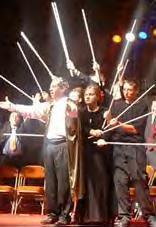Slice of Life "Slice of Life", is a term that I use to describe a style of drama that addresses everyday life situations. When writing about life, I look for the universal humor, challenges and victories. Our days are full of interesting situations (slices) that make our day whole. From the moment you get up in the morning until the moment you lay down at night, there are little slices of life that make for great drama. Often times it's something humorous or laboring or rewarding. It's usually an event that every family or married couple has experienced. To be a successful actor, you must find that common denominator that makes your character a believable part of the whole.Here are some examples of what I'm talking about:Example #1A piece of mail came to our house. As I was thumbing through the stack, my wife asked if there was any mail for her. I said, "Yes. It was a dear occupant letter", and put it on the counter for her to read later. She said, "How do you know it's for me, then?" I innocently said, "because it had something to do with loosing weight and fat in-take." I'm still alive to tell you that we both saw the humor in it and it became a slice of life sketch that we use in almost every dinner drama we do. She later found another dear occupant letter. I asked who it was for and she said it was definitely for me. I asked how she could tell. She said, "Have you every heard of Rogaine, the product for balding men?" You see, both of the subjects touched life in a real way. We used it in a humorous way. Humor is a great way to touch on sensitive subjects, but don't use it to cut the other one down. Let the humor unfold in a natural way, but try not to let closure take place until the play or sketch can have a happy ending.Example #2I was standing in line at a photography store waiting for my slide film to be developed. As I was waiting, an elderly lady wanted to buy one roll of film. The man working at the counter wanted to sell her a multi-pack of film. She told the man she just wanted one roll for her granddaughter's wedding and that one roll would be enough. The man remarked that the multi-pack isn't that much more expensive and the film was good until 2004. The elderly woman looked at the man and said, "Son, I don't even know if I'm good for that long". I've used that situation in one of my old man routines because it sounds like something an elderly person would say. It was a real slice of life. As you go through your daily life listen to people and watch them. You will learn neat things about life that make great additions to your writing or acting skills.Example #3I included a line in a short sketch from something my youngest daughter said while we were eating at Wendy's. When she was 3 years old she said, "I like cheeseburgers with cheese on them". I thought that was cute and worked it into a scene of a short sketch I wrote for a four-year-old son and his father to do while they were eating at McDonald's.
6.Listen to people while you are waiting in line at the grocery store. Listen to conversations in the mall or airport. You'll hear everyday life happening all around you. Everyday life makes great material for the Slices of Life. Not only listen, watch their actions very closely. Watch how people walk. Do they swing one arm more than the other? Do they shift their weight when they walk? Does their head bounce when they walk? Watching and listening to people is how I may go about deciding what things I may include when I create a character that I've been cast for.Character Development Exercise:This is an exercise that I will introduce to a new cast. Have your cast form a circle. Starting with the person on your left, have them walk to the center of the circle and say their name and then return back to their place in line. As they walk to the center, say their name and return, make sure the others in the circle take mental note of how that person walks, how they swing their arms. Answer some questions like…did they look down, did they focus on one person, did one arm swing more then the other. Did they walk fast or slow and did they lead with their shoulders? Were they shy, were they bold, were they embarrassed and so on? Now, everyone take everything that you observed by watching that one person and walk to the center of the circle as if you were that person. They will watch all of you as you do them. Then the next person will walk to the center of the circle, say their name, return back to their place in line and you will all do them. Then, the next person and so on. You can learn many things from watching people. You might see something in the way a certain person walks or swings their arms that you want to add to your character. Watch people in the mall or airport or even people you see everyday. If you've been asked to play a 5-year-old, then you need to spend time with 5 year olds. Listen to the way they talk. Listen to the purity of their words. Slang and euphemisms haven't dirtied their language. In fact some of the best communicators are children about the age of 2-3. They convince us with actions, facial expressions and movement because they haven't developed their language yet. Remember drama is doing. If you've been asked to portray an elderly person, then visit with some at the local retirement home. Visit with your grandparents. Watch how they walk. Do they shuffle their feet? Do their hands tremor? Watch how many extra considerations they have to go through just sit down and the process it takes for them to get up from sitting. BRING A PENCIL TO REHEARSAL
Wednesday, June 2, 2010
Subscribe to:
Post Comments (Atom)



No comments:
Post a Comment